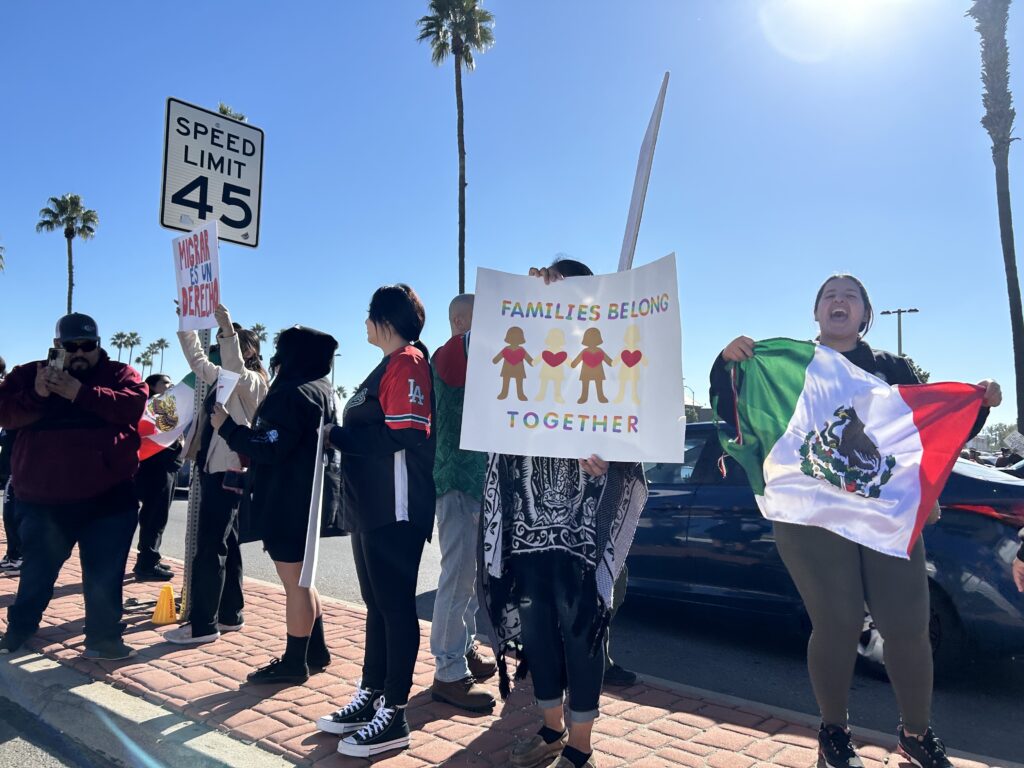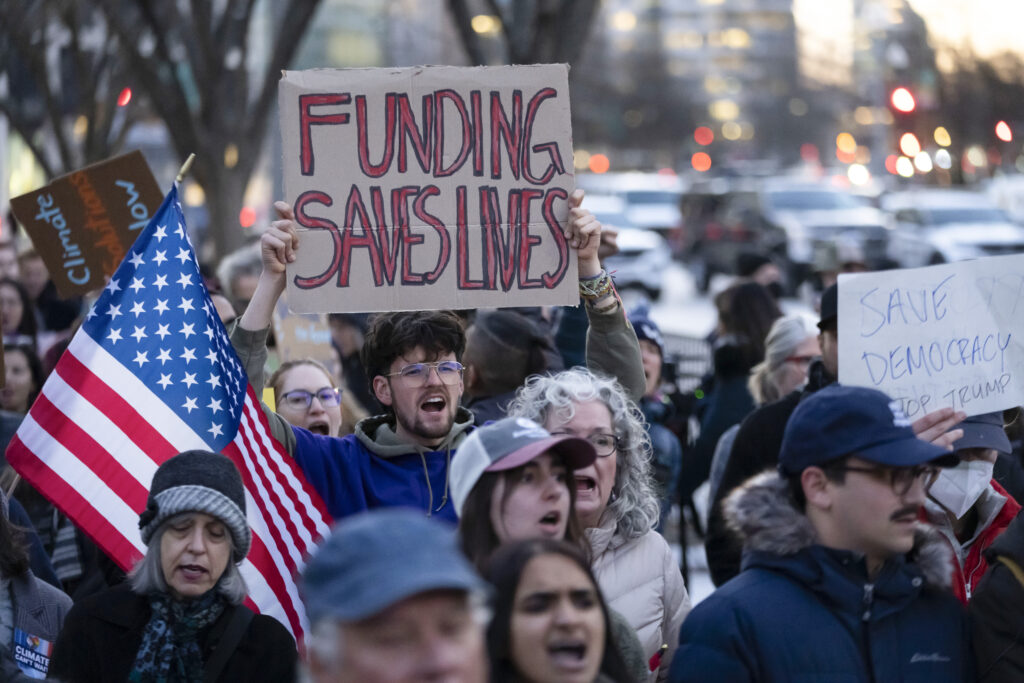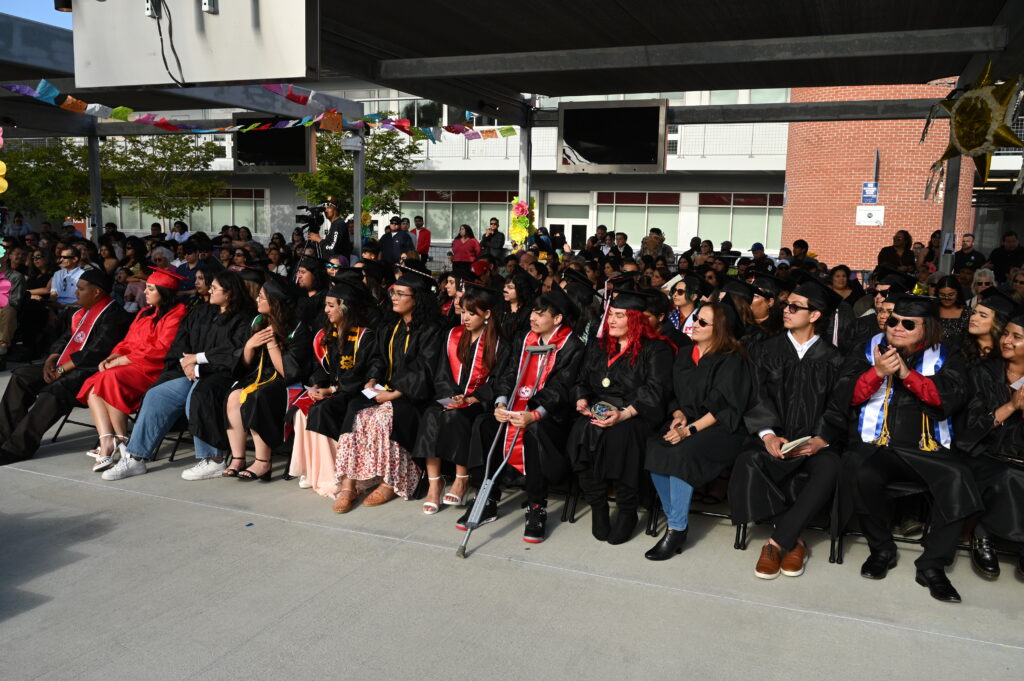
Protesters in Bakersfield rally against an extensive Border Patrol operation held on Jan. 14,.
Credit: Emma Gallegos / EdSource
This article has been updated with information from the California Department of Education, Long Beach Unified and San Diego Unified.
Este artículo está disponible en Español. Léelo en español.
California state officials and leaders of county offices of education and school districts quickly rebuked the Trump administration’s new guidance allowing immigration enforcement near or in schools.
“Schools must be safe spaces, not sites of fear,” said Alex Traverso, director of communications of the State Board of Education. “Every child deserves to learn without intimidation, and California will do all we can to protect our students.”
The directive issued Tuesday by Department of Homeland Security acting Secretary Benjamine Huffman reverses guidance that dates back to 2011, restricting Immigration and Customs Enforcement (ICE) and Customs and Border Protection (CBP) agencies from detaining immigrants near locations like schools, child care centers, playgrounds, hospitals and churches.
“This action empowers the brave men and women in CBP and ICE to enforce our immigration laws and catch criminal aliens — including murderers and rapists — who have illegally come into our country. Criminals will no longer be able to hide in America’s schools and churches to avoid arrest,” the Department of Homeland Security said in a statement Tuesday.
Under California law, school officials are not required to allow immigration agents to enter schools without a judicial warrant, according to recent guidance issued by California Attorney General Rob Bonta.
“It is disappointing, but unfortunately unsurprising that President Trump, in his first days in office, is focusing his time and energy on making his inhumane and irresponsible mass deportation agenda a reality. My team is actively reviewing his executive orders, and we stand ready to defend the rights of Californians if we find that the President has in any way violated the law — starting with our lawsuit, filed today, challenging the President’s unconstitutional executive order on birthright citizenship,” Bonta said.
The Association of California School Administrators issued a statement saying they are “troubled and deeply disappointed” in the Trump administration’s order allowing immigration enforcement near schools.
“This is an abuse of power and goes against the constitutional right of every child to have a public education,” the statement reads. “Schools are meant to be safe spaces where children can learn and grow without fear. … We know from past experience that this decision will result in some students not attending school, families disengaging, academics being disrupted, and severe impacts on social-emotional well-being.”
In response to requests for support from school districts and county offices of education, the California Department of Education sent a letter Tuesday to all county and school district superintendents and charter school administrators with resources for immigrant students and families and reminders about their rights.
“Our schools must be a safe place for children to learn and educators to teach. In line with federal and state law, California’s schools can take actions to ensure that all students have access to school campuses and educational opportunities without fear of deportation,” State Superintendent of Public Instruction Tony Thurmond said.
“In light of the new administration’s action today to overturn the sensitive locations policy, I want to reassure our education community that the Los Angeles County Office of Education (LACOE) remains steadfastly committed to ensuring that every student, regardless of their immigration status, has access to a safe, secure and nurturing learning environment,” said Debra Duardo, superintendent of schools for Los Angeles County, in a statement.
“The change to the policy does not overrule the student’s constitutional right to an education. It also does not overrule state constitutional protections,” Duardo continued. “It is important to reinforce that all students possess the right to a public education, independent of their immigration status. Our schools are mandated to ensure that no student is denied enrollment or faced with barriers to their educational opportunities based on their or their family’s immigration status.”
Many school districts, including Los Angeles Unified, Long Beach Unified, San Diego Unified and San Francisco Unified have reaffirmed “sanctuary resolutions” or sent letters to families in recent weeks, explaining their rights and sharing legal resources. Seventeen Santa Clara County superintendents and school board members signed a letter earlier this month, saying schools will continue to support immigrant students and families and reminding the public of a 1982 Supreme Court decision, Plyler v. Doe, which found that all children present in the United States have a right to a public education, regardless of their immigration status or their parents’ immigration status.
A spokesperson for Los Angeles Unified School District said the district has begun training all staff in how to respond if federal immigration officers show up at schools and will be distributing cards to students explaining their rights if approached by immigration agents.
“Los Angeles Unified School District is compelled by legal, professional, and moral obligations to protect rights of its students and employees, including privacy rights under FERPA (Family Educational Rights and Privacy Act), and state and federal constitutional rights, which include rights of all students to a free and public education,” a district spokesperson wrote in an email. “School officials do not collect or share information about the immigration status of students and their families. Since 2017, LAUSD has had a policy to not voluntarily cooperate with immigration enforcement actions by federal agencies.”
Fresno Unified School District is holding a series of workshops for families about immigrant rights. District spokesperson Diana Diaz wrote, “We want to urge our families who are concerned about possible detainment or deportation to please make a family preparedness plan NOW. This includes updating your child’s emergency card with their school so they can be released to another trusted adult if parents are unable.”
Teachers’ unions also rejected the Trump administration’s change.
“As educators and union members, we are committed to protecting our students — every single student, regardless of their immigration status,” said David Goldberg, president of the California Teachers Association, which represents 310,000 teachers, nurses, counselors, psychologists, librarians and other education staff across the state. “We have a professional and moral responsibility to keep our students safe if ICE comes to our communities. We will always come together in our union to ensure every public school is a safe space and to uphold the constitutionally protected right of all students to access a public education.”
Jeff Freitas, president of the California Federation of Teachers, the state’s second-largest teachers union, said in a statement, “Trump’s first day in office showed us that he is exactly who he told us he would be. His first actions as president direct hate and aim to stoke fear in the hearts of immigrant families and our LGBTQIA+ community. We can’t expect students to learn when they fear being separated from their parents, being bullied for being LGBTQIA+, or being treated differently based on the language they speak or the color of their skin.
“While we still hope to see Congress and our courts block these blatantly unconstitutional actions,” Freitas continued, “we won’t wait for them to act. Educators and school staff stand ready to fight back against every single action that stands to harm our members, our students, and our communities.”
EdSource reporter Diana Lambert contributed to this article.







